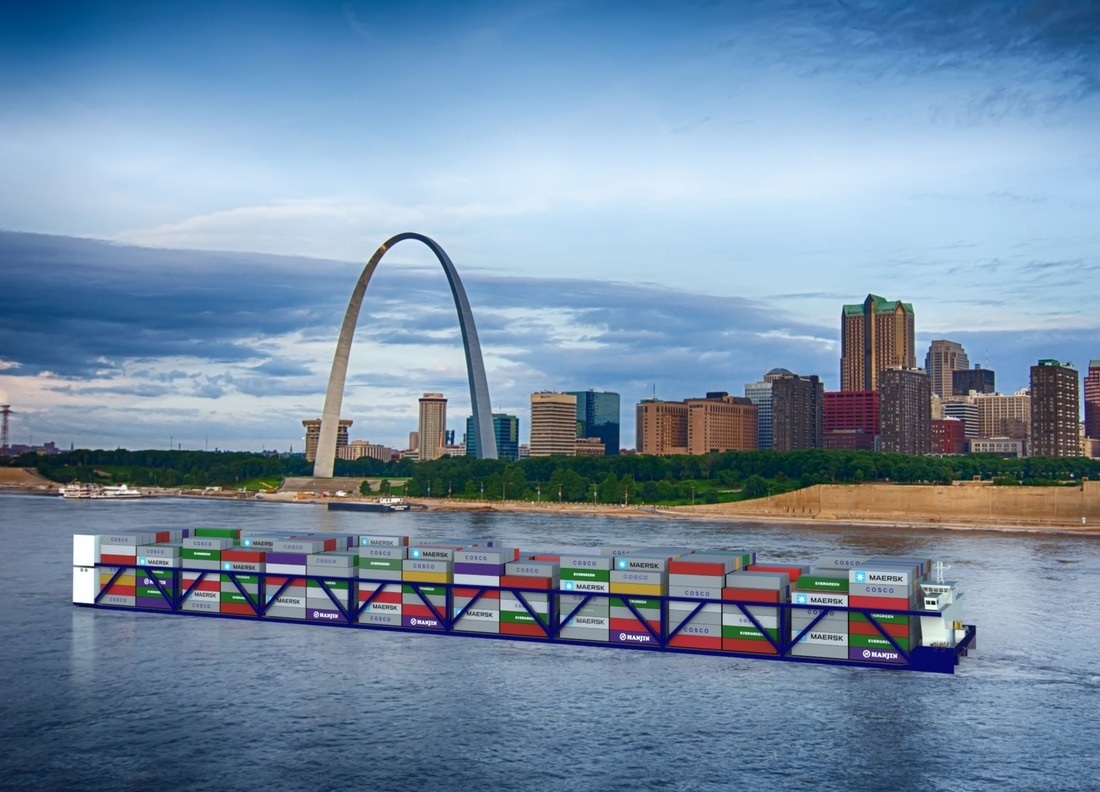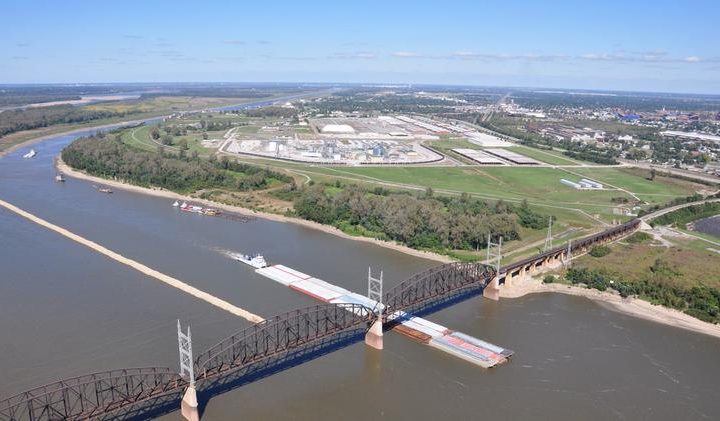
Innovative new service on track to launch in 2023, offering shippers an affordable, new option
Efforts to deliver a new Container-on-Vessel service to efficiently and affordably transport freight along the underutilized inland waterways have taken a big step forward in recent weeks. The plan calls for patented new waterway vessels that will move large volumes of goods and commodities along both the Mississippi River and Missouri River and their tributaries, serving key consolidation ports in St. Louis, Mo., and Memphis, Tenn., and several other feeder ports, effectively creating an all-water north-south trade lane connecting the Midwest to the lower Mississippi River and on to worldwide destinations. Service on the new route could be available to shippers within the next 30 months.
“Recent milestones signal progress for the ambitious plan, which has been in the works for four years,” said Mary Lamie, Executive Vice President of Multimodal Enterprises at Bi-State Development and head of the St. Louis Regional Freightway, one of the entities working to bring the new service to Missouri and the St. Louis region. “We have the geographic advantage of being in the center of the US and strategically located on the Mississippi River within a 500 mile radius of 80% of all agriculture production in the U.S., but it’s the infrastructure and intermodal capabilities we already have in place in Kansas City, Jefferson City and the St. Louis region that are key to providing a new containerized shipping option to reduce freight transportation costs and increase efficiency and reliability for shippers.”
A key milestone in the effort was reached in August, when American Patriot Holdings LLC (APH) and Plaquemines Port Harbor and Terminal District (PPHTD) in Louisiana announced it had signed a letter of intent (LOI) to develop a multimodal, state-of-the-art container terminal at its facility near the mouth of the Mississippi River, which would accommodate the new vessels delivering the service. The signing of the LOI marked the beginning of a significant due diligence process with key strategic partners.
“Our due diligence includes vetting all the components of the new system – the individual upriver ports, the gateway terminal in Plaquemines, and the vessels themselves,” said Sal Litrico, Chief Executive Officer, American Patriot Container Transport LLC (APCT), which is developing the new vessels.
He expects they will complete the due diligence phase in the first quarter of 2021, at which time they and their strategic partners, including potential investors, will have all the information in hand to make a final investment decision (FID), the next critical milestone to advance the project. If everyone signs on the dotted line, the project will then move full steam ahead. Contracts to build the vessels will be awarded to a shipyard, construction will start at Plaquemines, and the Midwest ports will begin making any needed modifications to handle the containerized cargo. Given the current timeline, initial service between Plaquemines and the Midwest ports would be operational two years from the FID, or sometime in the first quarter of 2023.
“These recent developments are an important step forward in bringing a Container-on-Vessel service to the Midwest and maximizing Missouri’s underutilized inland waterway system,” said Governor Mike Parson. “This innovative transportation service is a great opportunity to leverage our strategic location in the heart of the United States, advance statewide economic development, and improve our global competitiveness.”
The Vessels
The patented APCT vessels will be built in two sizes. The larger “Liner” vessel will measure 595 feet by 134 feet and have a capacity of 2,375 TEUs. A TEU is a 20-foot long by 8-foot tall shipping container. These Liner vessels will travel between the gateway terminal in Plaquemines and the Mississippi River ports in Memphis, Tenn., and St. Louis, Mo. The “Hybrid” vessel will have a container capacity of 1,700 TEUs and is designed to move through locks and low-lying bridges on the tributary rivers, serving feeder ports in Kansas City and Jefferson City in Missouri, Joliet and Cairo in Illinois and Fort Smith in Arkansas.
Both vessels are designed with a patented “Exoskeleton Hull Structure” designed to limit the vessels lightship weight to maximize cargo payload. The second patented feature is the “Minimal Wake Bow Structure” which minimizes hull resistance enabling upriver speed of 13 miles per hour with minimal wake. Expected round trip times to Memphis is six days and St. Louis in 10 days, significantly faster than traditional barge tows. The vessels will also be environmentally friendly, utilizing LNG (liquefied natural gas) power, and cargo flexible with ability to carry a diversity of cargo, including refrigerated containers. APCT plans to launch the COV service with four Hybrid vessels followed by a series of Liner vessels.
The Gateway Terminal & Sister Ports
The Gateway Terminal will be able to accommodate the world’s largest oceangoing container ships (22,000 TEUs) and offer Shippers all modes of transportation to the Midwest, giving beneficial cargo owners multiple options to move their goods.
“The Plaquemines Port Harbor and Terminal District is in an enviable position having a blank canvas to design a container terminal to meet the needs of beneficial cargo owners and shippers for 50 plus years. The advantage of new construction allows us to include the latest technology and environmentally friendly “green” aspects, demanded by shippers, at a lower cost than retrofitting an older port. Our terminal will operate on electricity, liquefied natural gas (LNG) and compressed natural gas (CNG) and will have the capacity to bunker LNG-powered vessels,” said Sandy Sanders, Executive Director of Plaquemines Port Harbor and Terminal District (PPHTD). “Our true gateway port will provide economical movement of cargo to our network of sister ports, such as Memphis, St. Louis and Joliet. Utilizing the river, rail, highway and air transit, we offer shippers and cargo owners distinct advantages and conceivably can reach 33 states. We will be like no other terminal in the nation designed for the future and with a focus of increasing exports of agricultural products by container.”
Kansas City and Jefferson City are the ports of call on the Missouri River, while the key consolidation port in the St. Louis region would be in Jefferson County at Herculaneum, which offers a strategic location on the Mississippi River, just south of St. Louis, the northern most ice-free, lock free port on the Mississippi River with easy access to the interstate system and access to the Class I railroads.
“The Statewide collaboration of Missouri’s public ports, the support of Governor Parson and our legislators, both State and Federal, and Missouri’s efforts to enhance commerce along our inland waterway system by bringing the revolutionary American Patriot Holdings container vessel to our state will assure job creation in our cities and towns along the rivers long into the future,” said Neal Breitweiser, Executive Director of the Jefferson County Port Authority.
The Opportunity
Oceangoing container ships continue to grow with capacities now in excess of 20,000 TEUs, adding to the existing congestion at ports on the east and west coasts and the strain on the freight network that’s been compounded by a rapid rebound in domestic intermodal business. Factor in an expected 10 billion-ton increase in maritime cargo in the next 10 years and the market is ripe for other options to get containerized cargoes into the heartland of America. The expansion of the Panama Canal to accommodate larger vessels is proving to be a tremendous opportunity for the future of freight by supporting the option to transport containers up the Mississippi River.
“Now more than ever, ocean carriers are extremely eager to reduce any disruption in global freight patterns and offer new innovative routes through partners,” said Global Gateway Logistics CEO Caitlin Murphy, who is excited to see the progress being made toward delivering the COV service to the Midwest and eager to begin offering it to clients. “We have to be able to offer beneficial cargo owners cost-cutting, transit-time cutting options to what exists today.”
Two independent, third-party studies validated the planned COV service will indeed deliver lower landed shipping cost, showing shippers using the new service could see cost savings over 30 percent. That’s information that APCT is excited to share with Midwest shippers for both import and export cargo.
“It’s time for us to be able to sit down and discuss the service,” said Litrico. “We can not only give potential customers a quote, we can give them a proposal for service using our vessels.”
To learn more about the St. Louis Regional Freightway, visit thefreightway.com. To get more details on the new service or request a proposal, shippers can contact Sal Litrico via email at slitrico@nullamericanpatriotholdings.com or phone at 813-924-9031.




